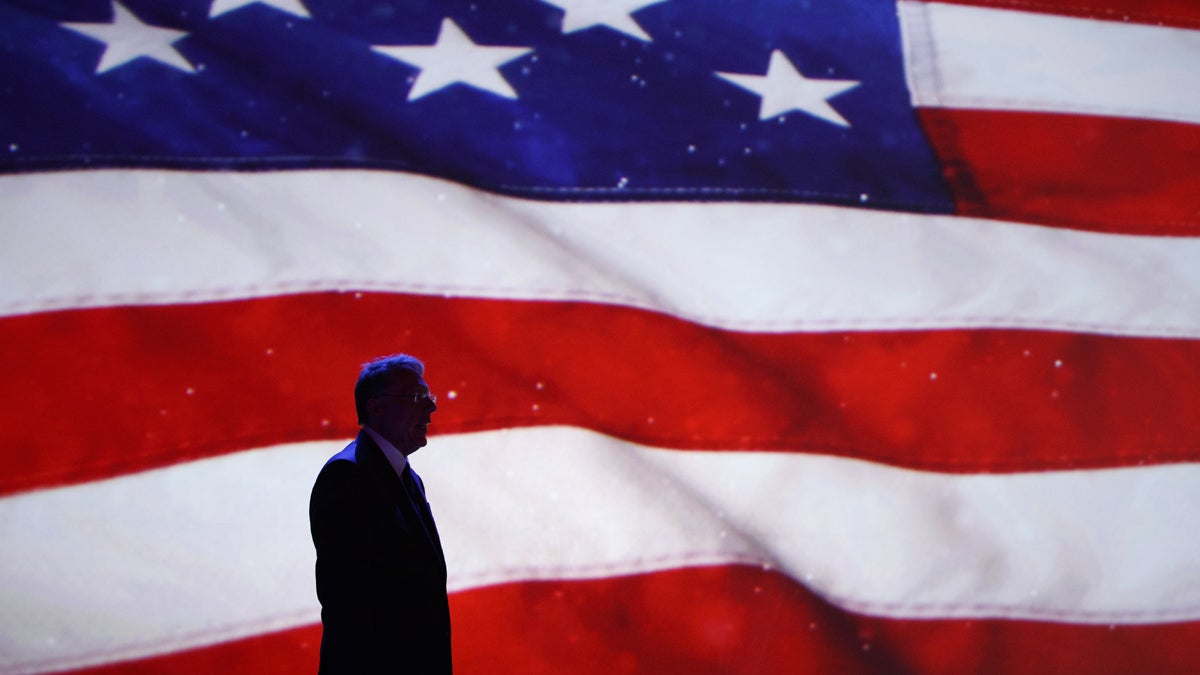Now is the time for Americans to redefine patriotism
Increasing evidence of Russian infiltration in the GOP, the NRA, and the American Right, provides an opportunity to unshackle ourselves from outdated definitions of patriotism

National Rifle Association Executive Vice President Wayne LaPierre listens to musician Lee Greenwood perform before the arrival of President Donald Trump to the National Rifle Association Leadership Conference, Friday, April 28, 2017, in Atlanta. (AP Photo/Evan Vucci, file)
“One of the great attractions of patriotism — it fulfills our worst wishes. In the person of our nation we are able, vicariously, to bully and cheat. Bully and cheat, what’s more, with a feeling that we are profoundly virtuous.”—Aldous Huxley
With increasing evidence of collusion between the Trump campaign and the Russians to influence the 2016 election, and Russian infiltration in the Republican Party, the NRA, and the American Right, accusations of treason are bubbling to the surface. It will take time to resolve these issues in the courts, as well as the court of public opinion and the media. It is certain, however, that these circumstances provide a perfect opportunity for the country to unshackle itself from outdated, narrow, and weaponized definitions of patriotism.
As George Washington advised the nation in his farewell address: “Guard against the impostures of pretended patriotism.”
In recent decades, the GOP has fashioned itself as the party of patriotism, often in terms of military might, though many of its standard bearers never served in the military, let alone saw a day in combat. In the age of Trump, the Republican Party has determined as a matter of policy who is American or worthy of citizenship, who is an insider and who is an outsider, who can stay and who must go, who is “one of us” and who is the enemy.
Certainly, some of this has translated into racial, ethnic, and religious terms, as the current White House has deemed Muslims, Latino immigrants, and others a fifth column. The Trump administration has waged assaults on the poor and disabled, and on the rights of the LGBTQ community as well, making disenfranchised and vulnerable groups feel as if they are not worthy of the rights of the majority in society.
During the campaign, Trump and his surrogates painted Black Lives Matter activists as terrorists and a criminal element. Today, the NRA continues the fearmongering with ads making open calls to violence against those who oppose the Trump presidency, and warning that Black Lives Matter will torture and kill white families in racial violence.
Now, we know that Russia has cultivated relationships with the conservative movement, just as it has forged ties with the Left in past decades, and most recently with the Green Party. The GOP has become the party of Putin — an authoritarian strongman who assassinates his opponents and murders journalists. There is growing appeal for the Russian kleptocrat among Republicans, who appreciate his ultraconservative Christian nationalism, antigay marriage stance, and overtures to the NRA, including hosting an NRA delegation in Moscow in 2015.
Efforts by Putin to soften up conservatives in the U.S. and penetrate their political space to make them more receptive to Russian policy goals is one thing, and requires our attention. Reports of Russian hacking in the 2016 election — and numerous investigations into a conspiracy by Trump and GOP officials to subvert that election — is quite another, and should cause us to sound the alarms. After all, that is treason, one of the most serious crimes one can commit, we are told.
As federal law states: “Whoever, owing allegiance to the United States, levies war against them or adheres to their enemies, giving them aid and comfort within the United States or elsewhere, is guilty of treason and shall suffer death, or shall be imprisoned not less than five years and fined under this title but not less than $10,000; and shall be incapable of holding any office under the United States.”
This does not include the accusations of money laundering, perjury, and other crimes Special Counsel Robert Mueller, New York Attorney General Eric Schneiderman, the Senate Intelligence Committee, and others are investigating.
The party that once fashioned itself as the party of patriotism is faced with the possibility that its leadership at the highest echelons of government is treasonous. In a worst case scenario, foreign agents of a hostile power, possibly President Trump, are occupying the White House and Capitol Hill. Now is the time to redefine patriotism. Nonpartisan civil servants who are keeping the government together under the most trying conditions, members of the intelligence community who are uncovering official wrongdoing, and activists and ordinary citizens regardless of party affiliation who are resisting an assault on civil liberties and the rule of law — these and other actions must be incorporated into the definition of patriotism.
“Patriotism is supporting your country all the time, and your government when it deserves it,” as Mark Twain once said.
During the Red Scare of the 1950s, when Trump’s now-deceased lawyer Roy Cohn was the brains of witch hunter Sen. Joseph McCarthy, there was a flawed definition of patriotism, reminding us of the words of Samuel Johnson, who said “Patriotism is the last refuge of the scoundrel.” During the Civil Rights Movement, social justice activists and antiwar organizers wanted to make America better, a most fitting example of patriotism. Some of them even risked and lost their lives to uphold principles greater than themselves. As Howard Zinn said, “Dissent is the highest form of patriotism.” Yet, such individuals and groups were branded as un-American enemies of the state, terrorists, and Communist troublemakers. Meanwhile, those scoundrels who hurled these accusations abused government power and fomented violence in the streets, representing the real threat to democracy.
FBI Director J. Edgar Hoover undermined justice and the rule of law under both Democratic and Republican administrations, and has a federal building named after him, as if he had been an American patriot. Hoover considered Martin Luther King a threat to national security and the “most notorious liar in the country,” and was obsessed with neutralizing him. The FBI monitored and harassed King and other civil rights leaders as part of COINTELPRO, a counterintelligence program to “prevent the RISE OF A ‘MESSIAH’ who could unify, and electrify, the militant black nationalist movement.” Hoover also said the Black Panther Party (BPP) was a violent group whose ultimate goal was insurrection, and said their Breakfast for Children Program was “potentially the greatest threat to efforts by authorities … to neutralize the BPP and destroy what it stands for.”
Today, as in the past, the U.S. faces threats to our freedom from within and without. There are silent, anonymous patriots standing alongside more visible, high-profile patriots, and faux patriots with bully pulpits and bullhorns who either mistake their own greed, selfishness, hate, and intolerance for true patriotism, or hope to fool the rest of us into believing it.
We should measure our patriotism based not on the number or size of the flags we wave. Symbols are empty without substance to back them up. Rather, we must ask: What are we doing to improve life for everyone, to ensure justice and dignity for all people? Denying health coverage to millions of Americans to finance a tax cut for the wealthy is not patriotic, nor is holding government office to increase your profit margin, or finding new ways to disenfranchise millions of voters.
“Patriotism is love of country. But you can’t love your country without loving your countrymen and countrywomen,” as Sen. Cory Booker said. “We don’t always have to agree, but we must empower each other, we must find the common ground, we must build bridges across our differences to pursue the common good.”
WHYY is your source for fact-based, in-depth journalism and information. As a nonprofit organization, we rely on financial support from readers like you. Please give today.




